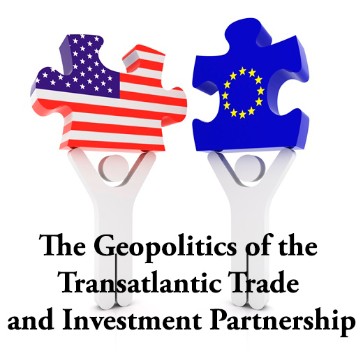
A FEW POINTS ON THE GEOPOLITICS OF THE TRANSATLANTIC TRADE AND INVESTMENT PARTNERSHIP
This is a cross-post with the Diplomatic Courier, authored by Joshua W. Walker and Alison O. Patch
Washington is abuzz once again with talk of free trade, presidential authority, and Congressional responsibility. Last week’s announcement that movement is being made towards fast-track authority for President Obama in vital trade deals is an encouraging sign that the U.S. Congress is serious about advancing free trade in the coming years.
On the day trade promotion authority (TPA) for President Obama was approved by a Senate committee, a half-day event on the Geopolitics of the Transatlantic Trade and Investment Partnership (TTIP) was hosted at the American Security Project (ASP). Jointly hosted by APCO Worldwide and ASP, the event outlined the main challenges and opportunities that lie ahead. Speakers at the conference included the Lilianne Plouman, minister of foreign trade and development cooperation for the Netherlands, Christopher Smart, special assistant to the President Obama and senior director for international economic affairs at the national Security Council and many others. A few items that came out of our conversation over the course of the day were noteworthy:
TTIP is about more than soft cheeses
A main point of contention in any trade deal is definition for restrictions on food safety standards. For Europeans, the concern is over American chicken, which is often considered full of dangerous hormones. On the other side of the pond Minister Plouman noted how, “Americans have some concern over [European] cheeses,” referencing the United States’ ban on imported un-pasteurized cheeses.
However, as one of the panelists noted, the challenges highlighted by the food safety fight are about more than soft cheeses. European preference for all-natural, chemical-free food and American preference for dirt-free, plastic-wrapped produce points to a fundamental difference in the two markets’ approaches to business, industry, and consumption. If TTIP is going to be worth anything, the crafters of the agreement will have to overcome these differences with compromises likely to upset food-watchers in the United States and in Europe.
TTIP is far from completion
The least flashy conclusion of the day is perhaps that due to entrenched positions on either side, TTIP is still far from completion. Even as TPA seems to be gaining traction in Congress (or at least there’s breath on the mirror), argument over protections for small businesses and issues such as food safety mean that questionable progress has been made in the details of the deal. Without TPA, European counterparts have no assurances that what they’re negotiating will survive in Congress. Progress will continue to stall as long as other nations are not willing to make concessions and forge compromises, which could then be undermined.
More Transparency is needed
A major challenge of TTIP is that if progress is being made on the deal, it’s impossible to know from the outside what that progress is and for which side. A common refrain on both sides of the Atlantic is that TTIP negotiations need to be opened for wider review by the people who it will be affecting. In her address, Minister Plouman highlighted what this means for Europeans by summarizing economist John Locke: Since “Government is derived from the people” TTIP cannot be seen to circumvent the people it seeks to serve or the procedures the European Union has established. The American public, ever less engaged on trade issues than their European counterparts, could also benefit from more transparency in the process. As it stands now, the skeptics may be kept at arms-length, but so are potential advocates and allies to the process.
TTIP has a real communications problem
In the end, what all this adds up to is that TTIP is suffering from a massive communications problem rooted in the lack of clarity over what the deal will mean for consumers and businesses alike. Talking points from official sources promising hundreds of millions of dollars in collective economic lift do little to assure a public still reeling from the 2008 financial crisis. As individuals and businesses fight to find their sea-legs, fears stiffen over increased competition. The biggest proponents of TTIP claim that the deal is about much more than the economics. If it is really about reforming our geostrategic relationships with old friends in a challenging era and building bridges across waters and communities, details of the agreement should be opened up to public representatives of the people at the very least.
About the authors: Joshua W. Walker, PhD is a Transatlantic Fellow at the German Marshall Fund of the United States and Vice-President of Global Programs at APCO Worldwide. Alison O. Patch of APCO Worldwide is an Energy Fellow and Master’s student studying Security Policy at George Washington University’s Elliott School of International Affairs.






[…] A Few Points on the Geopolitics of the Transatlantic Trade and Investment Partnership […]
[…] A Few Points on the Geopolitics of the Transatlantic Trade and Investment Partnership Joshua Walker Washington is abuzz once again with talk of free trade, presidential authority, and Congressional responsibility. Last week’s announcement that movement is being made towards fast-track authority for President Obama in vital trade deals is an encouraging sign that the U.S. Congress is serious about advancing free trade in the coming years. […]
[…] A Few Points on the Geopolitics of the Transatlantic Trade and Investment Partnership […]